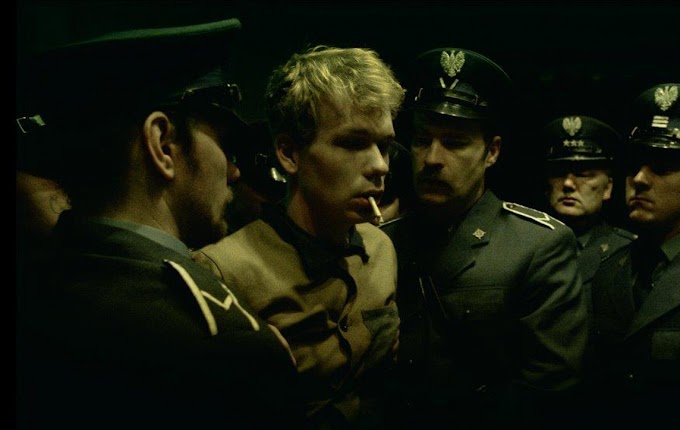Theorem has an exceptional audacity for the time, audacity tempered by an aestheticism that is sometimes precious; we discover images bordering on surrealism!
In Milan, a family of the great bourgeoisie receives a telegram announcing the unexpected arrival of a strange visitor: a young man, handsome, gentle and silent, who will insert himself without reason into the life of each one and upset it, maintaining relations with them that are both fleshly and spiritual. Soon after, a second telegram tells them that he is leaving, which plunges the family into distress, since everyone already lives in his dependence: the son and daughter whom he guides, the sick father whom he comforts, the servant he saves from suicide and the mother to whom he restores the taste of seduction.
It is a
theorem, of which each destiny is the corollary. Thus, to fill the inner void
they face, the five protagonists find in him a personal answer: the servant
will return to her home, to the countryside, inhabited by mystical forces such
as she heals a sick child, is subject to levitation phenomena and ends up being
buried alive, giving birth to a source of life. The other characters will have
a darker future: the mother will indulge in a sexual debauchery that she will
not be able to satisfy; the young girl will fall into hysterical catatonia and
will be hospitalized; the brother, who devotes himself to painting, will
urinate on his canvases; finally the father will abandon his factory to his
employees and, relieved of his property, will flee naked into the desert in the
grip of a quest for the absolute that looks more like a fit of madness.
Theorem is
probably Pasolini's most complex and confusing work. Here he engages in a very
particular exegesis on the signs of the sacred. I am not looking for scandal -
he wrote - God is scandal in this world. Christ, if he returned, would be
scandal again, he was already in his time, he would begin to be again today. My
stranger is not Jesus immersed in a current context, nor is he Eros in the
absolute sense, he is the messenger of the merciless god of Jehovah who,
through a concrete sign, a mysterious presence, robs mortals of their
falsehood. security.
It is indisputable that the sacred is permanently present in Pasolinian cinema and that it is even declined in several ways, sometimes respectful as in the Gospel according to Saint-Matthew (1964), sometimes disapproving as in Theorem, where the divine figure is by no means a spiritual revealer, but a sexual one. Thus, in the Pasolinian perspective, the sacred appears extravagantly as an accommodation between Marxist materialism and Christian spiritual idealism. This helps to ensure the originality of a work where the pleasure of the flesh, the total approval of the body and material enjoyment are placed in a sacred space, triviality and amorality transcending what Christianity refuses to accept. to accept in his sanctifying vision of man.
Through this
duality that unites joy and despair, love and hate, Pasolini only paints his
own condition of marginality. It is from his suffering, displayed with
lyricism, that the filmmaker gives his filmography a universal dimension. And
it is in this sense that the sacred takes its breadth, a theme which allows the
author to make coincide the materialism specific to his Marxist ideology and
the sacredness of a Christian religion that he respects, while provoking it
with provocation and vehemence, joining in this painful and morbid quest
artists like Francis Bacon and Antonin Artaud. For them to do is just as much
to undo. Pasolini did not stop filming in a hurry as if he guessed the
imminence of his end, while Pier Paolo ran the shady streets at nightfall,
losing himself in the mazes of his dark loves.
If he
creates, it will always be based on the totality of his being, beyond the
invisible dividing line between the hemispheres of good and evil, as if
enriched by his falls and as reinforced by the excess of his injuries. The film
arouses both admiration and embarrassment, but it has the merit of challenging
us, of disturbing any desire for a certain spiritual comfort. Contradictory
feelings are unmasked, offbeat, striking, suave and unhealthy images, which
through the characters, the filmmaker appears to us in a tragic stature, all
together ascetic and libertine, wise and helpless.
Finally
because his pain is ours, his fears are familiar to us and his quest is more
intimate to us than we dare admit to ourselves. This film resonates for a long
time in our memory like a cry and is reduced perhaps to a desperate appeal to
lost innocence.


.png)


1 Comments
Great one!
ReplyDelete